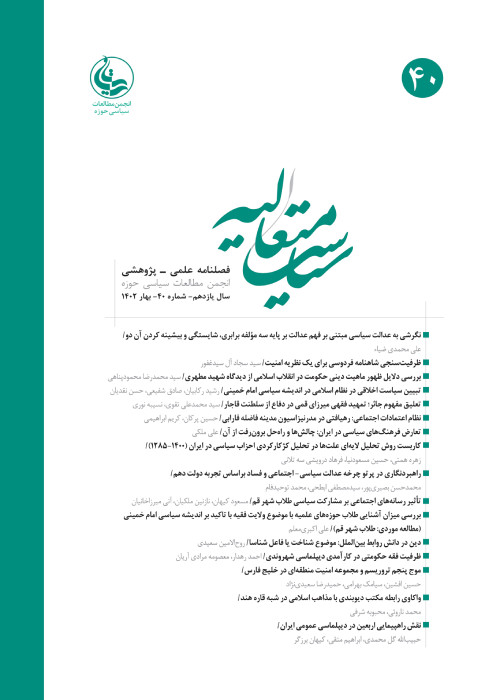Republic of Iran on Basis of Imam Khomeini and Basic Law Viewpoints
Abbas Heidari, Hamid-Reza Gardashti
Author(s):
Abstract:
Islamic Republic of Iran is a discipline based on religious democracy that supervises the implementation of Islamic laws in the political domain which is after presenting a successful example of the unification of Islam and democracy, in addition to scientific and practical scheming of the presence of republic in power structure. The role of people in selecting the deputies for the legislatory power and passing essential laws to the interest of the Islamic discipline, is a higher issue than the public Vilayah (supremacy) of Faqih (the jurist) which actualizes the Islamic discipline, regardless of legitimizing it. Participation of women in various political domains and the possibility of the presence of the Dhimmis in the Islamic government at the power structure is another aspect of adaptability of Islam and democracy in the example of Islamic Republic of Iran which, in addition to applying Islamic parameters to control the power such as piety of the governors, uses the presence of people as supervisor for the functionality of the government in practicing the role of ordering to the good and preventing from the evil for correcting the government affairs.
Key Words: Democracy, Interest, The Religious, Exterior Control of Power.
Republic of Iran on Basis of Imam Khomeini and Basic Law Viewpoints
Abbas Heidari1 Hamid-Reza Gardashti2
Abstract Islamic Republic of Iran is a discipline based on religious democracy that supervises the implementation of Islamic laws in the political domain which is after presenting a successful example of the unification of Islam and democracy, in addition to scientific and practical scheming of the presence of republic in power structure. The role of people in selecting the deputies for the legislatory power and passing essential laws to the interest of the Islamic discipline, is a higher issue than the public Vilayah (supremacy) of Faqih (the jurist) which actualizes the Islamic discipline, regardless of legitimizing it. Participation of women in various political domains and the possibility of the presence of the Dhimmis in the Islamic government at the power structure is another aspect of adaptability of Islam and democracy in the example of Islamic Republic of Iran which, in addition to applying Islamic parameters to control the power such as piety of the governors, uses the presence of people as supervisor for the functionality of the government in practicing the role of ordering to the good and preventing from the evil for correcting the government affairs.
Key Words: Democracy, Interest, The Religious, Exterior Control of Power.
Republic of Iran on Basis of Imam Khomeini and Basic Law Viewpoints
Abbas Heidari1 Hamid-Reza Gardashti2
Abstract Islamic Republic of Iran is a discipline based on religious democracy that supervises the implementation of Islamic laws in the political domain which is after presenting a successful example of the unification of Islam and democracy, in addition to scientific and practical scheming of the presence of republic in power structure. The role of people in selecting the deputies for the legislatory power and passing essential laws to the interest of the Islamic discipline, is a higher issue than the public Vilayah (supremacy) of Faqih (the jurist) which actualizes the Islamic discipline, regardless of legitimizing it. Participation of women in various political domains and the possibility of the presence of the Dhimmis in the Islamic government at the power structure is another aspect of adaptability of Islam and democracy in the example of Islamic Republic of Iran which, in addition to applying Islamic parameters to control the power such as piety of the governors, uses the presence of people as supervisor for the functionality of the government in practicing the role of ordering to the good and preventing from the evil for correcting the government affairs.
Language:
Persian
Published:
Journal of transcendent Policy, Volume:4 Issue: 14, 2017
Page:
117
magiran.com/p1644097
دانلود و مطالعه متن این مقاله با یکی از روشهای زیر امکان پذیر است:
اشتراک شخصی
با عضویت و پرداخت آنلاین حق اشتراک یکساله به مبلغ 1,390,000ريال میتوانید 70 عنوان مطلب دانلود کنید!
اشتراک سازمانی
به کتابخانه دانشگاه یا محل کار خود پیشنهاد کنید تا اشتراک سازمانی این پایگاه را برای دسترسی نامحدود همه کاربران به متن مطالب تهیه نمایند!
توجه!
- حق عضویت دریافتی صرف حمایت از نشریات عضو و نگهداری، تکمیل و توسعه مگیران میشود.
- پرداخت حق اشتراک و دانلود مقالات اجازه بازنشر آن در سایر رسانههای چاپی و دیجیتال را به کاربر نمیدهد.
In order to view content subscription is required
Personal subscription
Subscribe magiran.com for 70 € euros via PayPal and download 70 articles during a year.
Organization subscription
Please contact us to subscribe your university or library for unlimited access!


